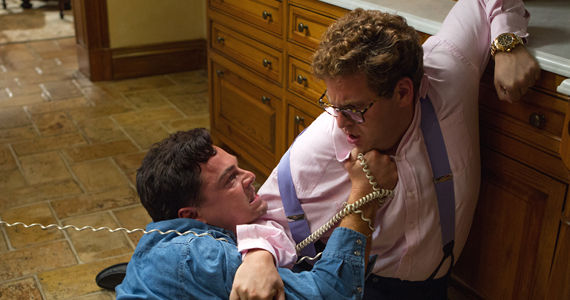In my podcast, I will review movie "The Wolf of Wall Street ".
"Hello everyone, and welcome to my podcast ' In this podcast, I will review one of my new movie "The Wolf of Wall Street ". If you did not watch this movie you definatli shoud!I will review some of the movie cast ,and talk brefly about movie. So if you are intresting just come and join me

Looking for a path through the woods, Jordan sniffs out work at a small penny-stock firm – a place filled with the type of schlubs who have never seen a real wolf at work. Within months Jordan is making money hand over fist, and he quickly moves on to a grander vision: opening a trading firm composed of his buddies and other roughneck salesmen who don’t mind swindling people in pursuit of personal gain. But with drugs, money, women and all-around excess overflowing his life, Jordan’s reign as “The Wolf of Wall Street” is soon threatened by a coup d’état led by a relentless FBI agent (Kyle Chandler).

Kyle Chandler in ‘The Wolf of Wall Street’
On the surface, The Wolf of Wall Street is a black comedy character study that is soaked in grime. Adapted from the memoir of the same name by the real Jordan Belfort, the script by Boardwalk Empire creator Terrence Winter uses voice-over narration as a framing device (like Goodfellas) in order to allow Belfort’s story to unfold “in his own language,” so to speak. Both the voice-over narration and scenes of ensemble dialogue are rattled off with an acerbic and foul-mouthed frankness that is almost poetic in its sheer level of crassness – and also darkly funny for a surprising amount of the film’s 3-hour runtime. As far as raunch-comedies go, this is one of the snappier and wittier ones made in a while – who knew Scorsese and Winter could beat the Farrelly Brothers at their own game?

Martin Scorsese’s ‘The Wolf of Wall Street’
For example: there is a reverse point-of-view shot of Belfort’s acolytes gathered in front of him that recurs throughout the film – a crowd which evolves from a handful of blue-collar schmoes in an old garage to (eventually) a packed hall full of admirers from all over the world. Much of the film is likewise sequenced according to circular experiences of manic debauchery the characters engage in over and over – starting in the high-fantasy of hedonistic allure, but slowly devolving into a macabre and perverse circus of amoral indulgence and grotesque behavior.

Leonardo DiCaprio and Jonah Hill in ‘The Wolf of Wall Street’
By the time Belfort goes through his inevitable fall (and subsequent resurrection), the man has become something so grotesque and off-putting that the lack of character development in the script can clearly be seen as a binding and damning statement – a frightful declaration that says, “Here America, this is your dark heart!” in much the same way that Daniel Plainview had thoroughly horrified us by the time he made his declaration of being “finished,” while squatted in his own slovenly mess.
In the case of The Wolf of Wall Street, the most frightening thing is not that this all happened (it did); or that it happened this way (it did); it’s that it might be (read: definitely is) still happening this way: the perverse mania the movie showers us in hasn’t been cured at all – it’s become an airborne contagion that is globally widespread and all-encompassing. To paraphrase Gordon Gekko, “Greed is good, and now it seems it’s legal,” and judging by WoWS, we should all be fundamentally terrified about that reality.

The new messiah
Leo has the more complicated task of balancing the grotesqueness of Belfort’s personality with moments of real charisma and insight – as well as the dry wit and meta comedy employed by the version of Belfort who narrates the tale. DiCaprio shines bright on all three fronts, without question.

Margot Robbie in ‘The Wolf of Wall Street’
In the end, The Wolf of Wall Street is an outrageous and repugnant reflection of something very real – and very rotten – at the core of our society. Some people will inevitably be so put off by the harsh composition of the message that they fail to heed the importance of that message; but in presenting so much of the bad and the ugly behind Wall Street so unflinchingly, Scorsese has crafted an insightful – and important – deconstruction of post-millennial America’s moral erosion. These are the barbarians at our gates.
No comments:
Post a Comment